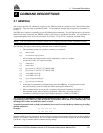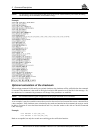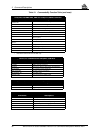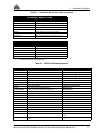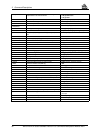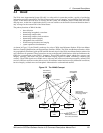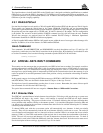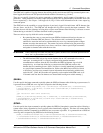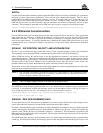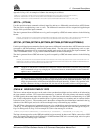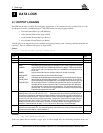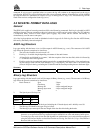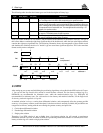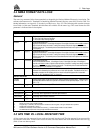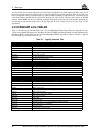
2 Command Descriptions
MiLLennium GPSCard Software Version 4.50 Command Descriptions Manual Rev 1 31
The GPSCard is capable of logging almanac data utilizing the NovAtel-format ASCII log command option ALMA.
Once logged, the data records will precede the header with the $ character (e.g., $
ALMA).
There are no specific NovAtel log option commands to independently specify output of ionospheric or
UTC
parameters. These parameters will always output following the $ALMA log (identifiable by the headers $IONA and
$
UTCA respectively). See Chapter 3 and Appendix D, Page 136 for more information on the ALMA output log
command option.
The GPSCard has the capability to accept injection of previously logged NovAtel-format ASCII almanac data
($
ALMA, $IONA, and $UTCA). The GPSCard will interpret this log data as special data input commands. This
provides the user with the advantage of being able to inject recent almanac data following a cold-start or
RESET
without having to wait the 12.5 minutes described in above paragraphs.
There are various ways by which this can be accomplished.
• By connecting the
COM1 or COM2 port from one GPSCard (reference) directly to the COM1 or
COM2 port of another GPSCard (remote). The reference card is assumed to be tracking
satellites for some time and can be commanded by the
ALMA log command option to output
almanac records to the remote card. The remote card can be assumed to be just powered-up
or
RESET and will recognize the $ALMA, $IONA, and $UTCA data as special input commands
and update its almanac tables with this new data.
REMEMBER: When connecting two GPSCard COM ports together, the MESSAGES command option should be
set to "OFF" to prevent inter-card "chatter".
• The MiLLennium GPSCard can log current almanac data to a PC connected to its
COM1 or
COM2 port. Assuming the PC is correctly configured using terminal emulator
communications software, then the PC can redirect the GPSCard almanac log to its disk
storage device. At a later time following a system restart, the GPSCard can have this
almanac.dat file (containing $
ALMA, $IONA, and $UTCA records) immediately downloaded
as a special input command for immediate use. Refer to the MiLLEnnium GPSCard Guide
to Installation and Operating manual for more information about interfacing with the
OEM
card with a PC. [Note: this procedure will generally not be required with OEM cards as all
12 channel cards now have an almanac save feature built in using non-volatile memory.]
$ALMA...
Use this special data input command to quickly update the GPSCard almanac tables following a system restart. It
is generated from a GPSCard
ALMA log and is accepted as the following format:
$ALMA,1,3.55148E-003,552960,744,-7.8174E-009,6.10457691E-002,-1.1820041E+000,
1.90436112E+000,-1.8119E-005,-3.6379E-012,1.45854758E-004,2.65602532E+007,
9.55600E-001,1,0,0*0C
...
(one record for each valid satellite)
...
$ALMA,31,4.90379E-003,552960,744,-7.9660E-009,-3.1044479E+000,6.13853346E-001,
1.92552900E+000,6.67572E-006,3.63797E-012,1.45861764E-004,2.65594027E+007,
9.61670E-001,1,0,0*3F
$IONA...
Use this special data input command to quickly update the GPSCard ionospheric corrections tables following a
system restart (always appended to $
ALMA records unless intentionally stripped). This data will ensure that the
initial position solutions computed by the GPSCard are as accurate as possible. It is generated from a GPSCard
ALMA log and is accepted by any GPSCard as the following format:
$IONA,1.0244548320770265E-008,1.4901161193847656E-008,-5.960464477539061E-008,
-1.192092895507812E-007,8.8064000000000017E+004,3.2768000000000010E+004, -
1.966080000000001E+005,-1.966080000000001E+005*02



